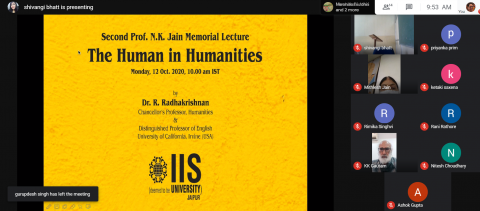Prof. NK Jain Memorial Lecture- "The Human in Humanities" by Dr. R. Radhakrishnan

Prof. N.K. Jain Memorial Lecture Report
The second Prof. N.K. Jain Memorial lecture was organized virtually by the Department of English on 12 October, 2020 on the topic ‘The Human in Humanities’. Dr. R. Radhakrishnan, Chancellor’s Professor, Humanities and distinguished professor at University of California was invited to deliver the lecture. The virtual session began with a warm welcome by Dr.RimikaSinghvi, Head of the Department of English, to the distinguished speaker, delegates, and friends and family of Prof. Jain. This was followed by a welcome address delivered byDr. Ashok Gupta, Vice Chancellor, who spoke extensively of Prof. Jain’s intellectual legacy. Dr.Rakhi Gupta, Registrar, then acquainted the audience with Dr.Radhakrishnan’s prolific contributions to the field of literature and western philosophy.
Prof. R. Radhakrishnan began his lecture by pointing out the importance of co-existence, both in terms of being inter-disciplinary, as well as,co-existence of different communities and groups. He expounded on the duality of the nature of knowledge. With most disciplines trying to look for an objective truth, humanities as a discipline struggles to balance this objective truth with the subjectivity of the human soul. This highlights the double bind of humanities which is not conducive to easy categorization; it co-exists with ambivalence and uncertainty. He went on to reflect on the nature of mimesis, how texts are supposed to mirror the realities of life, while maintaining a certain verisimilitude. He also added that man's existence in the world is infinitesimal,which embodies the paradox of humanity, for despite being infinitesimal, man has been able to change the world in unprecedented ways. Foucault’s concept of the erasure of man highlights beautifully how man is marked by the hubris of knowing the world while not being aware of his own self, anthropology being only a recently developed school. Climate change, however, has taught humans humility, mirrored in literature through reflections on the displacement of ecological refugees.
Prof Radhakrishnan also talked at length about Afro-pessimism, and the nature of humanism, which is such that it is simultaneously constructed and deconstructed in order to do justice to the complexity of the issue at hand. Literature, in turn, helps us account for our subjectivity. It favours an on-going negotiation for truth, where the realities of different and varying perspectives are taken note of. The human in humanism is, thus, both a matter of being and knowing.
With such vibrant thoughts, Prof. Radhakrishnan concluded his lecture, which was followed by an interactive Q/A session. Many of the students, guests and faculty members brought attention to different aspects of humanism, such as, its interaction with religious communities, intersectional feminism, human-animal relationships and the natally alienated populations. Prof. Radhakrishnan elaborated upon these topics with the concept of 'human' and how it needs to be redefined. Many questions also brought up the topic of preserving humanity in the times of a crisis. Prof. Radhakrishnan, taking inspiration from Nehru and Gandhi, remarked the importance of literature and art in keeping humanism alive. Moreover, he talked about including humanism in pedagogy to open up the space for empathy and bring out its substantive and real identity. He expressed his view of maintaining one's worth and dignity during crisis while keeping the human and the humanity alive; thereby going back to his primary idea of co-existence.
The richly comprehensive lecture turned out to be even more inclusive with the question answer session giving various new insights. The session ended with Dr.RimikaSinghvi expressing, for all the colleagues and students, a warm remembrance of Prof. N.K. Jain, and their gratitude to Prof. Radhakrishnan with a vote of thanks.

